Sport
Football: Draw in Moldova was worst day of my scots career
By Colin Duncan // IN THE space of five days last May Darren Fletcher helped Manchester United win the FA Cup and became the youngest player to captain Scotland in more than 100 years.
However, since leading out his country against Estonia the midfielder admits his international career has been a sorry tale of woe,culminating in the pathetic1-1draw with Moldova in Chisinau.
Sandwiched in between were a 3-0 home hammering by Hungary and a 1-0 reverse at the hands of Norway.However, it’s the manner of Scotland’s miserable display in Chisinau and his own poor performance that still rankles with Fletcher.
Indeed, while the 21-year-old has already crammed enough highs into a career most footballers can only dream about, he is still haunted by the 66 minutes he managed against the Moldovans last October.
Eight months on, the pain remains raw and Fletcher is desperate to overcome a hamstring problem so he can make amends at Hampden on Saturday.
He said: ‘The last game against Moldova was a real low point for me in a Scotland jersey. In terms of not being 100 per cent fit and getting subbed, it really hurt me.
Optimism ‘There were other things I don’t want to mention and it was a real disappointing time for me. There’s been lots of highs and lows and they will continue because that’s part of football.
‘No disrespect to Scotland, who are looking to go places, but it will be highs and lows all the way as we are that type of country.
‘But under Walter Smith we want to make as many highs and as few lows as possible.’
Having spurned the chance to accumulate points early in their Group 5 campaign by taking just one point from the opening two home matches with Slovenia and Norway, qualification now appears a remote possibility.
But Fletcher believes when the odds are stacked massively against Scotland they produce their best football. The youngster has been reared on success at Old Trafford and sees no reason to change his winning mentality while on Scotland duty.
Creditable draws against Germany and Spain and a victory over Holland under Berti Vogts have helped fill Fletcher with optimism for the remaining World Cup qualifiers.
He said: ‘We had the chance to take a commanding position from the start but now it looks as if we’re going to have to do it the hard way and go to places like Norway and Slovenia to get results.
‘But we are capable of getting six points and if wedo it will fill us with confidence for the rest of the campaign. All games are must wins.
‘In the past we’ve gone to places like Spain and Germany under Berti and produced results when the odds have been against us.
‘We seem to do quite well then but it’s games like this, at home to Moldova,where we have to take the game to the opposition and score goals. That’s when the real pressure starts.’
Fletcher has yet to feature under Walter Smith, having missed the Italian game in the San Siro with a knee injury.
But having worked under him at Old Trafford, where he was Sir Alex Ferguson’s assistant for six months last season, Fletcher is well aware of the qualities Smith brings to the national team.
He said: ‘The players at United really respected Walter in the short time he was there.
‘You look at his achievements at Rangers and what he did at Everton, but it’s only on the training ground that you realise how good a tactician and coach he is.
‘He is not purely a manager, He did the coaching at United where everyone took to him straight away.
‘It’s no surprise he’s starting to make things happen for Scotland.’
Even if Scotland can get their qualification hopes back on track with victories over Moldova on Saturday and Belarus next Wednesday, Fletcher admits the disappointment of losing last month’s FA Cup Final to Arsenal on penalties will continue to linger.
He added: ‘I think that sense of frustration will be there for a long time. I don’t think two games will make up for that as it wasa real blow to everybody.
‘The way the season panned out, people would have still talked about a disappointing campaign even if we’d won the FA Cup.
‘It would have salvaged a little bit but we are under no illusions as Manchester United just don’t see themselves winning FA Cups. They want bigger and better things.
‘The hurt will still be there next season and hopefully that bitter disappointment will help to drive us on
Featured
FC Sheriff Tiraspol victory: can national pride go hand in hand with political separatism?

A new football club has earned a leading place in the UEFA Champions League groups and starred in the headlines of worldwide football news yesterday. The Football Club Sheriff Tiraspol claimed a win with the score 2-1 against Real Madrid on the Santiago Bernabeu Stadium in Madrid. That made Sheriff Tiraspol the leader in Group D of the Champions League, including the football club in the groups of the most important European interclub competition for the first time ever.
International media outlets called it a miracle, a shock and a historic event, while strongly emphasizing the origin of the team and the existing political conflict between the two banks of the Dniester. “Football club from a pro-Russian separatist enclave in Moldova pulls off one of the greatest upsets in Champions League history,” claimed the news portals. “Sheriff crushed Real!” they said.
Moldovans made a big fuss out of it on social media, splitting into two groups: those who praised the team and the Republic of Moldova for making history and those who declared that the football club and their merits belong to Transnistria – a problematic breakaway region that claims to be a separate country.
Both groups are right and not right at the same time, as there is a bunch of ethical, political, social and practical matters that need to be considered.
Is it Moldova?
First of all, every Moldovan either from the right or left bank of Dniester (Transnistria) is free to identify himself with this achievement or not to do so, said Vitalie Spranceana, a sociologist, blogger, journalist and urban activist. According to him, boycotting the football club for being a separatist team is wrong.
At the same time, “it’s an illusion to think that territory matters when it comes to football clubs,” Spranceana claimed. “Big teams, the ones included in the Champions League, have long lost their connection both with the countries in which they operate, and with the cities in which they appeared and to which they linked their history. […] In the age of globalized commercial football, teams, including the so-called local ones, are nothing more than global traveling commercial circuses, incidentally linked to cities, but more closely linked to all sorts of dirty, semi-dirty and cleaner cash flows.”
What is more important in this case is the consistency, not so much of citizens, as of politicians from the government who have “no right to celebrate the success of separatism,” as they represent “the national interests, not the personal or collective pleasures of certain segments of the population,” believes the political expert Dionis Cenusa. The victory of FC Sheriff encourages Transnistrian separatism, which receives validation now, he also stated.
“I don’t know how it happens that the “proud Moldovans who chose democracy”, in their enthusiasm for Sheriff Tiraspol’s victory over Real Madrid, forget the need for total and unconditional withdrawal of Russian troops from Transnistria!” declared the journalist Vitalie Ciobanu.
Nowadays, FC Sheriff Tiraspol has no other choice than to represent Moldova internationally. For many years, the team used the Moldovan Football Federation in order to be able to participate in championships, including international ones. That is because the region remains unrecognised by the international community. However, the club’s victory is presented as that of Transnistria within the region, without any reference to the Republic of Moldova, its separatist character being applied in this case especially.
Is it a victory?
In fact, FC Sheriff Tiraspol joining the Champions League is a huge image breakthrough for the Transnistrian region, as the journalist Madalin Necsutu claimed. It is the success of the Tiraspol Club oligarchic patrons. From the practical point of view, FC Sheriff Tiraspol is a sports entity that serves its own interests and the interests of its owners, being dependent on the money invested by Tiraspol (but not only) oligarchs.
Here comes the real dilemma: the Transnistrian team, which is generously funded by money received from corruption schemes and money laundering, is waging an unequal fight with the rest of the Moldovan football clubs, the journalist also declared. The Tiraspol team is about to raise 15.6 million euro for reaching the Champions League groups and the amounts increase depending on their future performance. According to Necsutu, these money will go directly on the account of the club, not to the Moldovan Football Federation, creating an even bigger gab between FC Sheriff and other football clubs from Moldova who have much more modest financial possibilities.
“I do not see anything useful for Moldovan football, not a single Moldovan player is part of FC Sheriff Tiraspol. I do not see anything beneficial for the Moldovan Football Federation or any national team.”
Is it only about football?
FC Sheriff Tiraspol, with a total estimated value of 12.8 million euros, is controlled by Victor Gusan and Ilya Kazmala, being part of Sheriff Holding – a company that controls the trade of wholesale, retail food, fuels and medicine by having monopolies on these markets in Transnistria. The holding carries out car trading activities, but also operates in the field of construction and real estate. Gusan’s people also hold all of the main leadership offices in the breakaway region, from Parliament to the Prime Minister’s seat or the Presidency.
The football club is supported by a holding alleged of smuggling, corruption, money laundering and organised crime. Moldovan media outlets published investigations about the signals regarding the Sheriff’s holding involvement in the vote mobilization and remuneration of citizens on the left bank of the Dniester who participated in the snap parliamentary elections this summer and who were eager to vote for the pro-Russian socialist-communist bloc.
Considering the above, there is a great probability that the Republic of Moldova will still be represented by a football club that is not identified as being Moldovan, being funded from obscure money, growing in power and promoting the Transnistrian conflict in the future as well.
Photo: unknown
Economy
Chisinau Arena – a successful project or a hopeless failure?
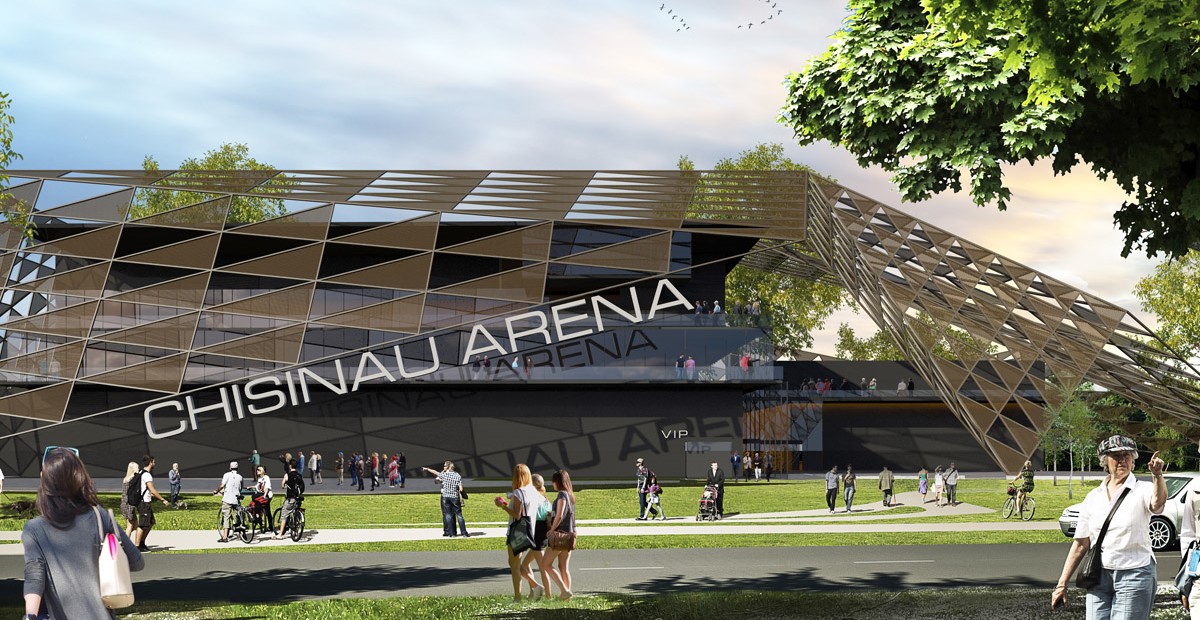
“The first large-scale social project since independence” – this is the way Chisinau Arena Aqua Center & Tennis Club is described on its official webpage. The futuristic complex, occupying a 10-hectare land, looks bright and optimistic on sketches and architectural models, especially when backgrounded by smiling politicians who present themselves as project initiators. Chisinau Arena is supposed to be the main sport and entertainment facility in the capital city, with basketball, volleyball, handball fields, tennis, mini football, boxing courts, concert, congress and exhibition halls, an aqua centre with swimming pools, an aqua park, fitness and SPA, as well as a café-restaurant area, an open public pool and an ice-skating rink.
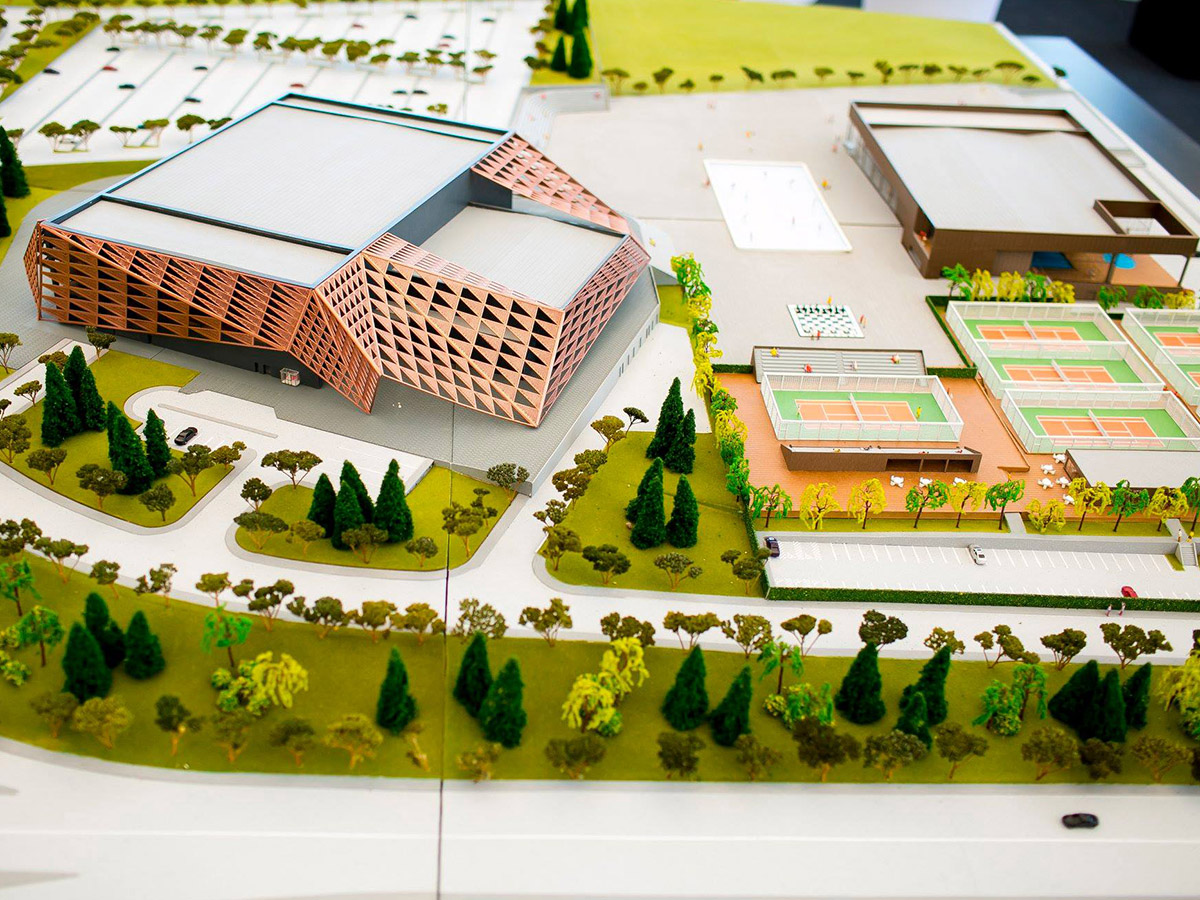
Source: chisinauarena.md

Source: chisinauarena.md
The big problem is that all of it is not ready yet. The opening date is not set, and in order to be able to be put it into operation, more funds from the state budget are still needed. It rather seems the longest-running money laundering project, along with the biggest corruption and embezzlement schemes of the country.
A partnership with issues
Chisinau Arena project was launched in 2018 by the former democratic leader, Vladimir Plahotniuc. First, democrats announced that the arena will be open in the fall of 2019. A public-private partnership between public institutions and a Turkish private company was created in August 2018.
But then, it was found that the complex could not be put into operation because it could not be connected to the gas, water and sewerage networks existing in the area. Also, it was not connected to the electricity networks. In May 2019, an additional agreement was signed, through which state authorities undertook to pay 1.5 million euros in addition to the initial contractual provisions in order to enable the connection to the water and sewerage systems. Thus, the initial deadline was extended to February 2020, then May 2020 and November 2020, suggesting the pandemic crisis would have ruined the authorities’ plans.
The Public Property Agency (PPA) stated that construction works carried out by the Turkish company were completed in December 2019. The initial agreement provided for the construction works to be carried by the private company only in the perimeter of 10 ha around the building. The rest was supposed to be done by the public partner. Still, the public-private partnership didn’t manage to ensure the connection of Chisinau Arena to the municipal networks, including the access roads. Several additional appendixes to the contract were signed, instalment payments were postponed, the public institutions responsible for the implementation of the project informed that they do not have the necessary resources for the design, construction and arrangement of the necessary networks, as the existing ones “do not comply with the technical requirements for the service of such a complex.”
The next issue was the access roads, which were never built, according to the administrator of Chisinau Arena. In May 2021, the state officials responsible for supervising the construction works declared that the building itself is ready. Still, a final document wasn’t signed, as the arrangement of access roads would require additional 2.8 million euros from the state budget. Moreover, the land on which the access roads need to be built are privately owned and do not belong to the complex. They would need to be declared of public utility, while negotiations with owners would need to be conducted in order to allocate other plots to them.
The expropriation of landowners (23 plots and 2 buildings) would require Government decisions and votes in Parliament, which would increase the public contribution by at least one more million euros. That was just another issue not taken into account in the initial phase of the project.
What is more, some former owners of lands on which Chisinau Arena was built claimed that, during the democratic government, they were pressured to give up their property without claiming any compensation, their access to their properties was restricted or they could not use their lands because of uncertainties and the refusal of authorities to issue permissive construction documents.
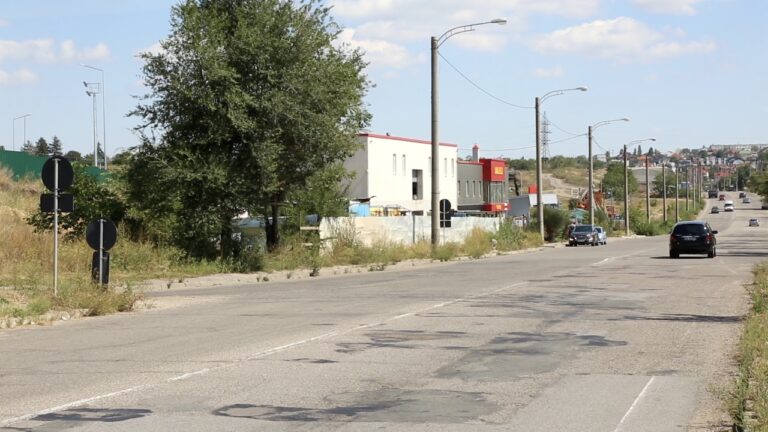
Source: zdg.md
The future of Chisinau Arena doesn’t look very bright. In case the complex is not opened in the next months, conservation costs of not less than 10 million lei per year would be implied. “There are a lot of systems that need to be operational: heating needs to be maintained at a certain level, recycling systems, humidity systems need to be kept at a certain level. […] We wouldn’t like to reach conservation and we already have a decision of the Board of Directors that it is not the best option for the complex,” explained Eduard Calancea, manager of the state company that administrates Chisinau Arena.
By September 2020, 11.5 million euros were allocated from the state budget for Chisinau Arena. Most of this amount was paid in 2018-2019 when the complex was built. Another 1.5 million euros were transferred to the private partner, in July 2020, as an instalment within the public-private partnership agreement.
Corruption, money laundering & embezzlement
All in all, the Government undertook to pay a total amount of 44.5 million euros (!) as the total cost of the project. The funds are supposed to be paid from the future incomes generated by the complex and from the state budget, in instalments, during a period of 12 years. Given that Chisinau Arena does not generate revenue, the annual costs and instalments are paid from the state budget nowadays.
A criminal case was filed, in October 2019, by the Anti-corruption Prosecutor’s Office against the actions of the government officials who participated in the launch of the Chisinau Arena. The group of officials were accused of embezzlement of foreign property in circumstances of abuse of power. In addition to the 10 ha on which the arena was built, the group would have allegedly stolen another 59 hectares of land from the agricultural circuit, which were pledged to the Turkish construction company. “If, due to state authorities fault, Chisinau Arena is not put into operation in the next period or at least one instalment is not paid, the 59 ha land will become foreign property,” MP Alexandru Slusari informed.
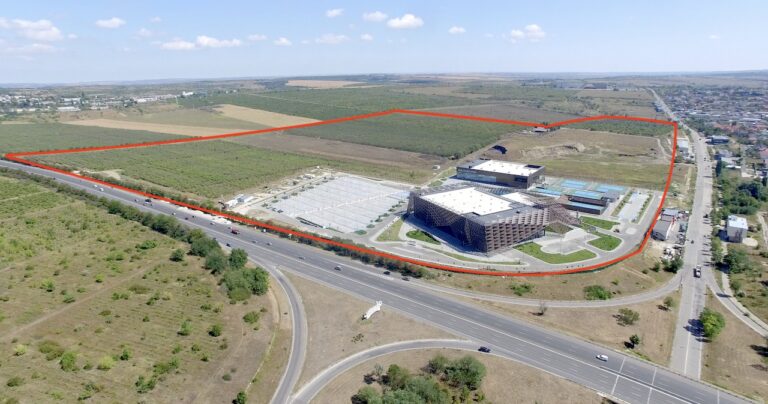
Source: zdg.md
There are no clear provisions in the contract signed with Turkish company that it would have to justify the costs, so there is a risk that the real cost of the project was overrated. “This project was conceived as a scheme that would eventually lead to the takeover by certain groups of the property and land that was allocated for this project. There is such an impression created that the amount of 43 million euros was randomly named. No supporting documents have been found to clarify how this amount was reached. Things have changed over time and now the cost of this project is 44.5 million euros. The risks are that, in this case, the real cost is lower than what the state spends for this project,” Maia Sandu pointed out.
Prosecutors are also in the process of checking the legality of the way the contract price is formed, as well as granting preferential tax conditions to the company that built the arena (the tax exemption applied on the value added tax when importing building materials, without diminishing the payments to suppliers).
After all the things revealed and those that were not discovered yet, the question is how much the citizens of the country would still have to pay until Chisinau Arena would start to generate revenue.
Photo: chisinauarena.md
Sport
FC Zimbru Chișinău will no longer exist
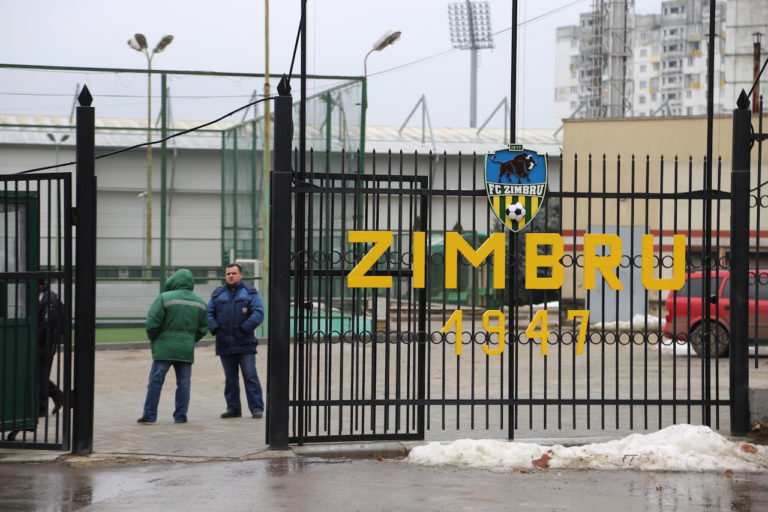
Moldova was never a big name in the worldwide football competitions. Unfortunately, the country has even less chances to become known in this sport, as one of the oldest and most titled football clubs in the Republic of Moldova, FC Zimbru Chișinău, withdraws from the National Division, but also from all football competitions. The announcement was made today by Sevastian Botnari, general manager of the football club, informed ZdG.
The main withdrawal reason is the lack of investments in the area. “As of today, the senior team of Zimbru football club will not exist,” claimed Botnari.
According to the football club manager, the main and only investor of the national-level football team, Nicolae Ciornii, has decided to refrain from further investments. “The precarious situation within the club forced us to take this decision.”
The football club’s financial problems were reported since February 2019, when several footballers alarmed the public regarding the disastrous financial situation within the club. In the period of 2017-2018 the possibility of the FC Zimbru football team’s bankruptcy was discussed.
Moreover, in December 2017, the club was forced by the court to disburse a debt of 52 million lei for some lease contracts that weren’t paid.
FC Zimbru Chișinău is one of the oldest football teams in Moldova, being founded in 1947. It is also the most beloved football club in the country, gathering thousands of fans especially at European cups. FC Zimbru has won eight times the title of champion of Moldova and six times the cup of Moldova in football. Starting with 2018, the football club was the only representative of the capital city in the National Division of the country.
According to the Moldovan Football Federation (MFF), there are 43 216 football players registered in Moldova,out of which 17 987 are aged under 18 years. Also, there are 2053 football teams registered, 11 non-amateur football clubs and 147 amateur clubs.
Photo: zdg.md





















